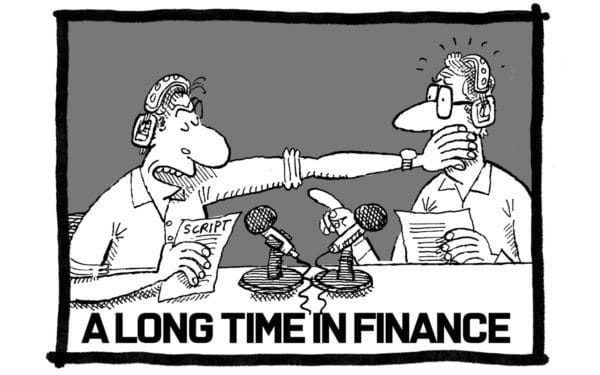Ian Stewart is Deloitte’s Chief Economist in the UK. This is his Monday Briefing, a succinct and eclectic weekly take on economics and finance.
Brexit fears ease
Last week two of the UK’s leading economic forecasters concluded that Brexit is unlikely to cause a sharp slowdown in UK growth over the next three years. This is big news.
Last summer, in the weeks after the referendum, talk of the UK falling into recession was rife. Economists slashed their UK growth forecasts. By August economists expected GDP growth would fall away in the second half of 2016 as Brexit hit home. They saw the UK eking out meagre growth of 0.6% in 2017, the slowest since the recession in 2009.
Instead activity accelerated from the middle of last year and for 2016 as a whole GDP growth came in at 2.0%, the best of any major industrialised nation. Consumers kept spending and borrowing in the second half of 2016 and the services sector saw good growth.
Last autumn the focus of market concern shifted to 2017 and three Brexit-related risks – from higher inflation hitting consumer spending, the effects of uncertainty on business investment and, in March, the triggering of Article 50.
These risks remain, but the scale of the threat they pose has reduced.
The UK’s most venerable independent economic forecaster, the National Institute of Economic and Social Research (NIESR), forecasts that UK activity will slow only marginally, from 2.0% in 2016 to 1.7% in 2017, with growth then picking up to 1.9% in 2018 and 2.1% in 2019.
In the National Institute’s forecasts Brexit triggers the long-awaited rebalancing of growth in the UK economy from consumption to exports. A weaker pound makes exports more competitive and imports more costly. The result is a marked shrinkage of the trade gap with the current account balance narrowing to the lowest level in 20 years by 2018. Brexit, ironically, could be a catalyst for making the UK economy more, not less, export-focussed.
The Bank of England expects there to be no slowdown in UK growth this year, with the economy growing by 2.0%, followed by 1.6% in 2017 and 1.8% in 2018. The Bank sees consumers bolstering spending power this year by saving less and borrowing more.
UK economy will certainly not get through Brexit scot free. The Bank and the National Institute expect UK growth to be weaker over the next three years than was widely expected ahead of the referendum. The Bank and the Institute see an average UK growth rate around the 1.8% mark for each of the next three years. That compares with market expectations of average growth of 2.1% in April.
But this is a modest derating of medium term growth compared to what many feared. Two of the UK’s leading economic forecasters now think the period which starts with the triggering of Article 50 and ends with the UK’s departure from the EU will be one of continuing growth.
To all of this one might say that if post-referendum forecasts for UK growth were so wrong why should we place so much weight on these forecasts. Maybe they are too rosy, just as last summer’s forecasts were too pessimistic.
It is a fair point. But three factors support a more optimistic interpretation of the effects of Brexit than seven months ago.
First, the actual performance of the UK since the vote and has been solid. The knowledge that the UK is leaving the EU has not induced a Lehman-style deterioration in confidence.
Second, financial conditions remain benign. There has been no big hit to financial markets, credit conditions are favourable and, in a sign of confidence about future growth, investors have been buying equities.
Third, the global economy, and therefore demand for British exports, is in better shape than it was last summer. Euro area growth accelerated into the end of the year and in January business confidence in the region hit a six year high. The US Federal Reserve is sufficiently confident about America’s recovery to signal that US rates will rise further this year.
None of this is to diminish the historic nature of Britain’s departure from the EU, nor the risks and uncertainties ahead. But, seven months on from the referendum, fears that Brexit will lead to a collapse in Britain’s growth rate have eased.
Our review of last week’s news
The FTSE 100 equity index ended last week up 0.7% at 7,188.
Politics dominated the news last week, with a raft of policy announcements from President Trump and a UK Parliamentary debate on Brexit and the publication of a White Paper on leaving the EU.
Economics and business
* The US jobs market strengthened, adding a better than expected 227,000 jobs in January, but wage growth slowed.
* US equities sold off as investors continued to evaluate the latest policies from the White House.
* Several leading US business leaders criticised President Trump’s new immigration policy and two Federal courts overturned the travel ban.
* President Trump continued to cast doubt on the future of the EU, and labelled the bloc a “vehicle for Germany”.
* President Trump signed an executive order to review the 2010 Dodd-Frank financial regulations which he described as, “a disaster”.
* Peter Navarro, head of the new US National Trade Council, criticised Germany for benefitting from a “grossly undervalued” euro.
* German finance minister, Wolfgang Schäuble, appeared partially to endorse Mr Navarro’s comment saying said that because the European Central Bank is setting policy for the euro area the euro is “too low” and policy “too loose” for Germany.
* Donald Tusk, head of the European Council, said that US policy, along with an assertive China, an aggressive Russia and radical Islam, was a challenge facing Europe.
* According to the Bank of England’s deputy governor President Trump’s election has been positive for global financial markets and the UK economy.
* Deloitte’s Crane Survey shows that construction levels in the UK’s big regional cities has returned to pre-crisis levels.
* UK manufacturing activity grew in January at its fastest rate in two and a half years, although the pace of service activity slowed.
* Inflation across developed economies has hit a two year high.
* The euro area growth accelerated to 0.5% in Q4, underscoring resilience in in the face of political uncertainty.
* Despite improving EU economic data, Bank of America Merrill Lynch’s fund managers’ survey shows record low sentiment among asset managers towards the euro area.
* Mass protest in Romania forced the government to reverse its plan to ease penalties for corruption.
* UK supermarkets are rationing the number of iceberg lettuce and broccoli customers can buy, as poor weather in southern Europe has caused shortages
Brexit and European politics
* British MPs voted 498 to 114 in favour of the government invoking Article 50, beginning the process of exiting the EU.
* The government published a Brexit bill setting out its negotiation goals.
* MPs have tabled more pages of amendments to the Brexit bill than there are words in the original bill itself – 142 pages compared to 137 words.
* The UK may be permitted to negotiate its EU exit and begin talks about a new trade agreement with the EU at the same time, according to the European parliament’s chief Brexit negotiator.
* Conservative peer and prominent Remain supporter Jonathan Hill urged Remain and Leave supporters to come together to discuss the practicalities of Brexit.
* In a sign of UK consumer resilience Deloitte’s Q4 Consumer Tracker shows consumer confidence higher now than a year ago.
* Citing the weak pound and Brexit uncertainties Moody’s halved their forecast for growth in UK air passenger volumes over the next two years.
* France’s far-right party leader Marine Le Pen said France was threatened by the “two totalitarianisms” of globalisation and Islamic fundamentalism
And finally…
* The People’s Online daily reports that a Chinese man hoping to cycle cross-country home for Chinese New Year realised 30 days into his trip that he had been travelling in the wrong direction and was 500km off course; with police and well-wishers eventually buying him a train ticket home – lunar cycle.
Ian Stewart is Deloitte’s Chief Economist in the UK. His Monday Briefing can be subscribed to here.



